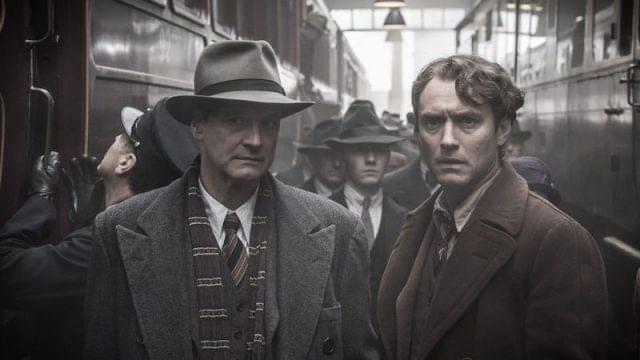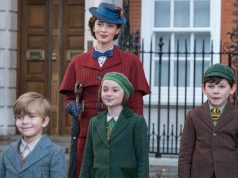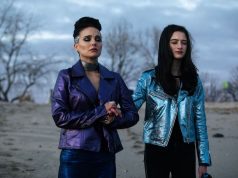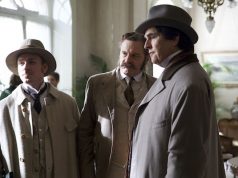
The biography from which “Genius” is adapted is called “Max Perkins: Editor of Genius” (by A. Scott Berg), and it’s about the literary publisher who worked with such legends as F. Scott Fitzgerald, Ernest Hemingway, and Thomas Wolfe. How fascinating his life must have been — a non-artist intimately involved in fine-tuning works of art. Or maybe it’s fair to call him an artist, too. As the title suggests, he edited geniuses, but to do so effectively, he must have been a man of some genius himself.
That’s the book, though. The movie, adapted by John Logan (“Gladiator”) and helmed by acclaimed theater director Michael Grandage (his movie debut), reduces the title to one word, focuses almost exclusively on Perkins’ work with Wolfe, and is indeed more a biopic of Wolfe than of Perkins. Unsurprisingly, it falls short on both fronts, offering no insight into (or even evidence of) Wolfe’s brilliance, much less his editor’s. Whose story is it, Wolfe’s or Perkins’? Neither. And both. That’s the problem.
We begin in 1929, with Perkins (played by Colin Firth in an American accent) already at the top of his field, the celebrated editor who discovered Fitzgerald and nurtured Hemingway. He’s humble, though, in that Colin Firthy way, and lives a respectable life with his wife Louise (Laura Linney) and four doting daughters.
Then a flamboyant, loquacious Southerner named Thomas Wolfe (Jude Law in a jaunty North Carolina accent) comes waltzing into his life. Wolfe’s novel, a sprawling, auto-autobiographical coming-of-age tentatively titled “O Lost,” has been rejected by every other publisher in New York, but Max reads it and is struck. He declares his intention to publish it, making a fast friend of Tom, who becomes an amusing (if sometimes embarrassing) fixture in his life. “O Lost” becomes “Look Homeward, Angel,” and it’s a bestseller.
Tom’s second novel is a 5,000-page monstrosity that he and Max spend the next two years editing into something publishable. It’s during some of these scenes that Grandage occasionally captures the synergistic thrill of author and editor chiseling prose together, a process that is admittedly difficult to portray on film. His greater focus, though, is the friendship between Perkins, who always wanted a son, and Wolfe, 16 years his junior, who needs a father figure. This aspect of the film feels rote, but it’s buoyed by Firth and Law’s charisma.
Max is also drawn into Tom’s personal affairs, which are far more colorful than his own. Tom has a stormy relationship with his mildly nuts mistress, Aline Bernstein (Nicole Kidman), a married stage designer who’s weirdly jealous of all the time he spends with Max. In one scene, she barges into Max’s office during a meeting with Tom and dramatically crams a fistful of pills into her mouth. (“You’re over-writing the scene, Mrs. Bernstein,” Max tells her on another occasion.) So she’s fun.
In the periphery are Fitzgerald (Guy Pearce), whose wife Zelda (Vanessa Kirby) is headed for the sanitarium, and Hemingway (Dominic West), who’s headed for Spain. (You’ll wish they both had more screen time.) Almost as peripheral, unfortunately, is Laura Linney as Max’s wife, who doesn’t get much to do beyond the “Why do you spend so much time working?” routine that is a cliche of biopics.
Through it all, what fails to emerge is the word we started with: genius. The film tells us that Wolfe is one, but doesn’t back it up. For all the time we spend with him, we don’t understand what makes him tick — or what makes him special. Max Perkins, meanwhile, feels like a supporting character in his own story. Both roles are acted well enough; it’s the writing that’s bland and shallow, hinting at greatness but not doing the work to get there. It isn’t bad; it’s just profoundly mediocre.
C+ (1 hr., 43 min.; )





